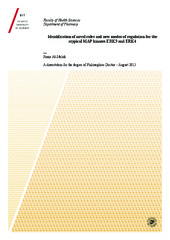| dc.contributor.advisor | Seternes, Ole-Morten | |
| dc.contributor.author | Al-Mahdi, Rania | |
| dc.date.accessioned | 2016-01-11T13:22:56Z | |
| dc.date.available | 2016-01-11T13:22:56Z | |
| dc.date.issued | 2015-11-13 | |
| dc.description.abstract | The atypical MAP kinases ERK3 and ERK4 are the main characters in this study. ERK3 and ERK4 were for long considered as orphan proteins without known upstream activators. However, in 2011 two studies had detected that group I p-21 protein activated kinase (PAKs) can constitutively phosphorylate ERK3 and ERK4 in their activation loop. The only well-characterized substrate for ERK3 and ERK4 at that time was MAP kinase-activated protein kinase 5 (MK5), also known by the name of PRAK. Recently, the steroid receptor co-activator 3 (SRC-3) has been identified as a substrate for ERK3. What was known about the biological function of ERK3 and ERK4 was limited and working with them was a challenge. In the last four years, more studies were focusing on ERK3 than ERK4. The first aim of this project was to identify novel regulators for both ERK3 and ERK4 in order to gain more knowledge to understand their physiological function. The second aim was to investigate the physiological function of ERK3 regarding cell morphology and migration. Here, in this study we focused mainly about the interaction of ERK3 and ERK4 with two large protein families that are involved in cancer and cancer treatment. The first protein family we investigated was the dual-specificity MAPK phosphatases (DUSPs), where we have used a yeast 2-hybrid assay to analyze all ten members of the mammalian MAP kinase phosphatase (MKP) family for their ability to interact with ERK3 and ERK4. We found that these kinases specifically interact with DUSP2. In paper I, we investigated the interaction between ERK3/ERK4 and DUSP2 in depth. The second protein family that we were interested in was the heat shock protein family. Preliminary data from co-precipitation studies done in our lab to identify interaction partners for ERK3 and ERK4, followed by mass-spectrometry analysis suggested that Hsp90 could be an interaction partner for ERK3 and ERK4. This observation was later supported by results from several high throughput analyses. The interaction between ERK3 and ERK4 with Hsp90 was investigated in paper III. Beside the detection of new targets for ERK3 and ERK4, we chose to investigate the role of ERK3 in cell morphology and migration as described in paper II. Our choice to study only the role of ERK3 in cell migration was based on previous studies, however, that does not exclude ERK4 from also might have a role in cell migration, adhesion and invasion. | en_US |
| dc.description.doctoraltype | ph.d. | en_US |
| dc.description.popularabstract | Disputas – Cand.master in odontology/master in human cell biology Rania Al-Mahdi
Cand.master in odontology/master in human cell biology Rania Al-Mahdi disputerer for ph.d.-graden i medisinske fag og vil offentlig forsvare avhandlingen:
Identification of novel roles and new modes of regulation for the atypical MAP kinases ERK3 and ERK4
Summary of the thesis:
Kinases are proteins that regulate the activity of other proteins by the addition of phosphate groups. Genes encoding protein kinases are amongst the most commonly mutated genes in human cancer. ERK3 and ERK4 are atypical kinases belonging to the MAP kinase family. Very little is known about the function of ERK3 and ERK4, but MAP kinase pathways in general are evolutionarily conserved and control fundamental cellular processes. Protein kinases having a role in cell survival, proliferation, and migration, are important drug targets because of their roles in cancer cell growth and tumor invasion. In this PhD project, a new role for ERK3 in cell morphology and migration was identified. ERK3 was also found to influence the loss of cell-cell adhesion and F-actin rearrangement. We have discovered that the dual-specificity phosphatase2 (DUSP2) can interact and dephosphorylate (regulate the activity of) both ERK3 and ERK4. In addition we have found that Hsp90 can interact with and stabilize ERK4. The inhibition of Hsp90 is a very promising target for cancer therapy.
Personal information:
Rania Al-Mahdi born in 1976 in Sana’a, Yemen. She had her degree in dentistry at University of Science and Technology in Yemen in 2000. She had her master grade in Human Cell Biology at University of Bergen in 2009. She worked at the GenØk-center of Biosafety for almost a year. She started her PhD education in September 2010 at UiT-The Arctic University of Norway, Department of Pharmacy, Research group of pharmacology. Her project was funded by the Norwegian Cancer Society. She spent a year as a visiting PhD student at the King´s College London, London, UK from October 2012 to September 2013.
Contact details:
Name: Rania Al-Mahdi
Faculty/department: Faculty of Health Sciences, Department of Pharmacy
e-mail: rania.al-mahdi@uit.no | en_US |
| dc.description.sponsorship | The project was financed by the Norwegian Cancer Society (Kreftforeningen) | en_US |
| dc.description | Paper I and III of this thesis are not available in Munin.<br>Paper I. The inducible nuclear phosphatase DUSP2/PAC1 specifically interacts with and dephosphorylates the atypical MAP kinases ERK3 and ERK4 and can regulate the output of the ERK3/ERK4-MK5 signalling axis. Maria Perander, Rania Al-Mahdi, Thomas C. Jensen, Jennifer A.L. Nunn, Hanne Kildalsen, Bjarne Johansen, Mads Gabrielsen, Stephen M. Keyse and Ole-Morten Seternes. (Manuscript).<br>Paper III. Regulation of the atypical MAP kinases ERK4 by Hsp90. Rania Al-Mahdi, Bjarne Johansen, Hanne Kildalsen and Ole-Morten Seternes. (Manuscript). | en_US |
| dc.identifier.uri | https://hdl.handle.net/10037/8355 | |
| dc.identifier.urn | URN:NBN:no-uit_munin_7930 | |
| dc.language.iso | eng | en_US |
| dc.publisher | UiT The Arctic University of Norway | en_US |
| dc.publisher | UiT Norges arktiske universitet | en_US |
| dc.rights.accessRights | openAccess | |
| dc.rights.holder | Copyright 2015 The Author(s) | |
| dc.rights.uri | https://creativecommons.org/licenses/by-nc-sa/3.0 | en_US |
| dc.rights | Attribution-NonCommercial-ShareAlike 3.0 Unported (CC BY-NC-SA 3.0) | en_US |
| dc.subject | VDP::Medical disciplines: 700::Basic medical, dental and veterinary science disciplines: 710::Medical molecular biology: 711 | en_US |
| dc.subject | cell migration, cell signalling, protein interaction, cancer, cell adhesion, protein kinases | en_US |
| dc.title | Identification of novel roles and new modes of regulation for the atypical MAP kinases ERK3 and ERK4 | en_US |
| dc.type | Doctoral thesis | en_US |
| dc.type | Doktorgradsavhandling | en_US |


 English
English norsk
norsk

